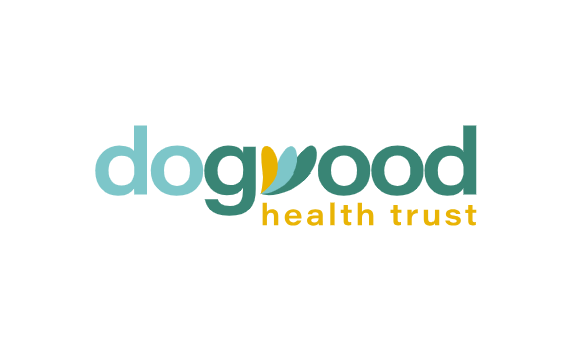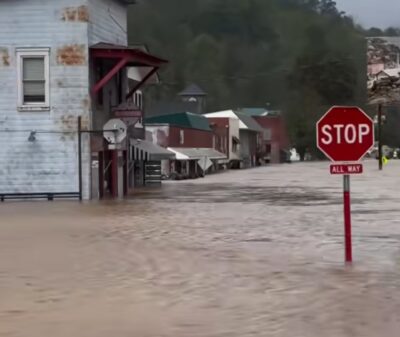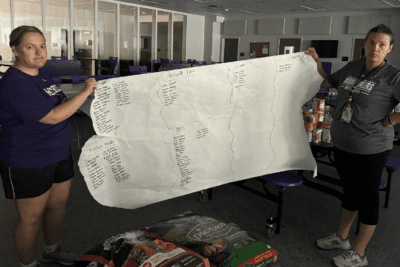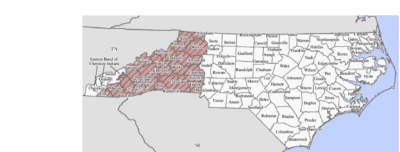
Dogwood Health Trust has announced more than $30 million in initial relief funding following the devastation across Western North Carolina (WNC) from Hurricane Helene, according to a press release.
This funding responds to short-term, immediate needs and was approved by a unanimous vote by the full board of directors at an emergency meeting on Oct. 3.
In this initial relief funding, Dogwood is prioritizing support for local organizations that will help local people and organizations now and in the days to come, according to the press release.
Dogwood’s initial support is organized in three areas:
- Supporting organizations that can quickly deploy resources and respond to urgent needs of people and geographic areas most affected;
- Supporting assessment, navigation, and legal services associated with FEMA response; and
- Maintaining critical health services across the region.
“Hurricane Helene has affected the people and communities of Western North Carolina in unimaginable ways,” said Dr. Susan Mims, CEO of Dogwood Health Trust. “Our response includes this funding for short-term relief, and we will be here for long-term recovery and rebuilding as well. We are working with our funded partners to get resources to all our neighbors in need throughout the region.”
Emergency and Disaster Response Fund
A lead grant of $10 million will go to the Emergency and Disaster Response Fund at the Community Foundation of Western North Carolina, which is positioned to grant smaller amounts to human service and community-based organizations throughout the region quickly.
According to the website, EDRF is funding organizations providing emergency relief to those affected by Hurricane Helene.
Initially, $25,000 grants will be awarded on a rolling basis. Grant amounts of more than $25,000 will be considered on a case-by-case basis and determined according to the availability of funds, the severity of need in the community served, and the other sources of support available to the organizations.
Grant requests should be for frontline human service needs. They are intended to cover the extraordinary costs of providing emergency relief services to individuals or eligible organizations affected by the storm, says the website.
Deadlines and dates
Nonprofits will use a simple, expedited process to access funds with grants considered and awarded on a rolling basis, says the website. Organizations can submit only one request for funding at this time.
Eligibility
An organization applying for a grant must be:
- A community-based nonprofit designated by the IRS as 501(c) (3), a faith-based organization, or a public agency serving individuals and families that were affected by the storm in the WNC area specified below.
- Serving the following counties and area in WNC: Avery, Buncombe, Burke, Cherokee, Clay, Graham, Haywood, Henderson, Jackson, Macon, Madison, McDowell, Mitchell, Polk, Rutherford, Swain, Transylvania, and Yancey counties, including the Qualla Boundary.
- An organization with a demonstrated track record of providing frontline human services responding to demand, or the storm has directly affected the organization’s ability to provide basic human services.
Priority will be given to agencies in WNC serving those most significantly affected. As North Carolina’s emergency response teams complete their assessments, EDRF grant guidelines may be adjusted to align with the region’s needs.
What is not funded through the ERDF
EDRF grants generally do not support: debt retirement, sectarian religious purposes, partisan political purposes, or individuals, according to the website.
EDRF grants are not for ongoing operational costs or costs that are or will be covered by other sources. Eligibility for emergency public funding (local, state or federal) will be addressed in the application.
How to apply
If you have questions regarding eligibility, contact Tara Scholtz, senior program Officer, by email or at 828-367-9913.
You can submit an application via the online application process. For technical assistance with the online grant system, please contact Diane Crisp, grants manager, by email or at 828-367-9904. Applicants will be notified by email upon receipt of application.
If connectivity is an issue, email or call Alana Nottage at 828-254-4960 with the following information: name of organization and county(ies) to be served; amount requested: $25,000 or less; and whether the request is for direct services or to address impact to your organization’s ability to provide direct services. Please briefly describe the local situation and needs including primary weather-related impact on people served and the organization’s disaster-related services that would be supported by a grant.
Expedited review of applications will take place with funding decisions announced on a rolling basis.
A brief online end-of-grant report verifying use of grant funds and results will be required. Instructions will be included in the grant award communication.
Other Dogwood investments
More than $20 million will be given to support direct service nonprofits and organizations with deep connections to local communities throughout Western North Carolina. These funds will be used to support community needs and the employees working in these organizations tirelessly each day, including:
1. Deploy resources and respond to urgent needs of people and geographic areas most affected
- MANNA FoodBank – to support food distribution, disaster response and ongoing operations. MANNA’s primary location was destroyed by flooding, but they are actively responding to community needs at locations like the WNC Farmers Market.
- Impact Health – to help support their 60 human service organizations (HSOs) with daily operations across the region. Many are focusing on purchasing and distributing food from local farmers to people in need.
- The AMY Wellness Foundation and Gateway Wellness Foundation – to support and regrant dollars for on-the-ground recovery efforts in Avery, Mitchell and Yancey counties (AMY) and Burke, McDowell, Polk and Rutherford counties (Gateway).
- WNC Communities – to support local farmers and help coordinate their distribution of fresh, nutritious foods to local community members.
2. Assessment, navigation and legal services for FEMA response
- Pisgah Legal Services – to help residents access legal services and navigate filings with FEMA across WNC. Filing can be complex, so it is important that affected community members receive legal support from local Pisgah staff in their communities. Pisgah now has offices throughout WNC and a mobile Justice Bus as a result of former Dogwood funding.
- The Centralina Foundation – to support Councils of Government in WNC in coordinating assessments for FEMA response and the needs of local governments.
3. Maintain critical health services
- WNC’s seven local Federally Qualified Health Centers (FQHCs) – to support their continued operations so community members can access the clinical health care they need across WNC.
According to the press release, Dogwood will make more funding announcements in the coming weeks for recovery and rebuilding efforts, including responding to the needs of small businesses, among other opportunities.



